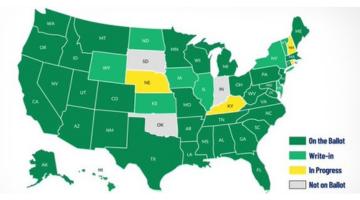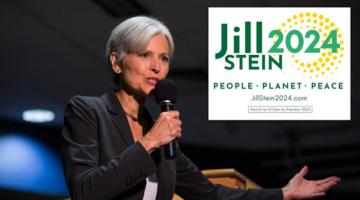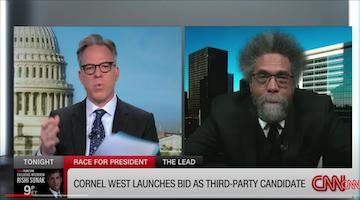Dr. Cornel West is a candidate for the Green Party’s 2024 nomination. I spoke to ballot access expert Richard Winger, who thinks that if he wins, the Greens might qualify for the ballot in all 50 states, though Democrats will do their best to stop them.
ANN GARRISON: Richard, do you think the Green Party might finally qualify in all 50 states with as high profile and greatly admired a candidate as Dr. Cornel West? I’m going to use 2016 as a reference for what’s possible because Greens got on the ballot in 44 states that year, when they ran Dr. Jill Stein, but only on 30 in 2020, when they ran Howie Hawkins.
RICHARD WINGER: It's possible that they could get on in all 50 states in 2024. The biggest barrier is New York. If they can conquer New York, I think they can get on in all the other states.
AG: Weren't they on the ballot in New York in 2016?
RW: Yes. And 2020. But then Governor Cuomo told the legislature he wanted to make ballot access a lot more difficult. And he put that in the budget bill, so the legislature had to pass it.
So now it's very ironic, but for the first time, in 2024, New York might be the only state in the whole country without a single minor party or independent candidate on the ballot for president. And New York has such a strong tradition of third parties.
AG: Why did Governor Cuomo do that?
RW: Because he was mad at the Working Families Party (WFP).
AG: Why was that?
RW: Because the WFP endorsed Cynthia Nixon in the Democratic primary for Governor in 2018. She didn't win her primary against Cuomo, but he held a grudge.
AG: So what are the challenges of getting on now in New York, which has 29 electoral votes?
RW: Well, we have two lawsuits pending in New York. And I have some hope that the law can be improved before the 2024 election.
AG: Lawsuits by the Green Party and who else?
RW: One of the lawsuits has nothing to do with any of these independent parties. It was filed by the mayor of Buffalo, New York, in 2021. He was running for re-election, and he lost the Democratic primary, but in New York, you could lose the primary and still be a third party or independent candidate in the general election.
So he turned in petitions to do that. But the legislature had also just bumped up the filing deadline from August to May, so he missed it. But he has a very strong lawsuit against that. A ruling on it should come out any day now, and if he wins it, I think the New York legislature will be forced to rewrite the ballot access laws, and they might do more than just fix the deadline.
AG: So that would be good for the Green Party.
RW: If he wins, it’ll be good for all third parties.
AG: Okay, and what about the Green Party legal action?
RW: That’s a Green Party and Libertarian Party lawsuit. It's less likely to succeed, but it might. It's pending in the Supreme Court because it lost in the lower courts.
AG: And what's the legal argument there?
RW: That the requirements the New York legislature created in 2020 are just too unfairly burdensome. They tripled the number of signatures and tripled the distribution requirements—meaning you have to get a whole bunch of signatures in half the congressional districts.
And they didn’t even extend the petitioning period. The signatures you have to gather went from 15,000 to 45,000, and you have to do it in six weeks.
AG: Forty-five thousand signatures in six weeks?
RW: Yes. That’s one of the shortest petitioning windows in the country.
AG: Well, the Green Party already has access in the other three most populous states, California, Texas, and Florida, which have 55, 38, and 29 electoral votes, respectively, and those are all secure.
RW: Oh, sure. They're perfectly safe in all three of those states.
AG: In 2016, the three states that the Green Party failed to qualify in were Nevada, South Dakota, and Oklahoma, and they qualified only for write-in status in Georgia, North Carolina, and Indiana. Are those states particularly difficult to qualify in?
RW: No, except for Indiana, which requires 36,944 signatures. In Indiana the Green Party also has a very strong lawsuit pending to make the requirements less onerous. In North Carolina, the Green Party is on the ballot right now. And South Dakota eased its requirements in 2016. Now it's only 3502 signatures. Oklahoma also eased its law, but it's still pretty mean.
Here's what Oklahoma did. They said, “Oh, you can get on for president without a petition at all. But you have to pay a filing fee of $35,000. Or gather 35,592 signatures.” It would be thrilling though, if any left party got on the ballot in Oklahoma for president because no left party has been on the ballot there since 1936, way longer than in any other state. Ralph Nader never got on in Oklahoma; they didn't have the filing fee option when he ran. Even Henry Wallace couldn't get on in Oklahoma.
AG: And what about Nevada?
RW: Well, it's hard, but doable. It takes 10,096 signatures.
AG: What about Georgia, where the party only had write-in status in 2016?
RW: Jill Stein didn't get on in Georgia in 2016, even though the petition requirement was only 7500 signatures; ditto with Howie Hawkins's run in 2020. The requirement had been lowered due to a court case that the Green Party won in 2013. Before their court victory, the requirement had been so high that Greens hadn't even seriously tried to qualify in Georgia. So after the requirement was lowered in 2013, the Georgia Greens didn't have any real experience trying to petition.
AG: What about Montana, which is represented as a gray area on the Greens' 2024 ballot access map, as though its status is uncertain? In 2018 and 2020, Montana Democrats mounted successful challenges to Green Party signatures on ballot access petitions. In both years, they contacted people who had signed the Green Party petitions and asked them to retract their signatures.
RW: Then the Green Party won a ballot access case against Montana in the 9th Circuit in 2022, and was therefore on the ballot that year. But there were no statewide races up in Montana that year, and the law is unclear on whether a party should lose its status in a year with no statewide races up. Montana’s Secretary of State has declined to rule on whether the Green Party is still on the ballot.
The Montana Green Party is reorganizing under the leadership of Steve Kelly. When they feel their organization is in good shape they will demand that the Secretary of State issue a ruling, and if the Secretary of State doesn't put them on, they will sue.
AG: The liberal Democratic press that covered Dr. West’s announcement almost uniformly reported the same story—that he could cost President Biden the election. Is the Democratic Party working to keep Greens off the ballot?
RW: Democratic legislatures are not currently trying to make it more difficult to get on for president, though they certainly have in the past. Earlier this year Democratic majorities in New Mexico and Minnesota made ballot access more difficult but for offices other than president.
There are court precedents that say due process does not permit states to make the ballot access laws harder right in the middle of the election season, although “election season” is not precisely defined anywhere. They have to make the restrictive laws take effect before the next election season begins. So generally the Greens are safe from hostile changes for the remainder of this year and in 2024. Most state legislatures have gone home for the year anyway.
AG: But Democrats use more than state laws to attack third party and independent candidates. Tell us about that.
RW: The Democratic Party has tried to keep left parties and independent candidates off the ballot in many elections in the past, from 1936 to 2020, although they haven't done it every time. They do it when they're scared.
They try to keep Green and independent candidates off the ballot when they’re scared they might lose a close race. They were scared of Nader’s run as an independent in 2004, after what happened in 2000. And they were scared of Howie Hawkins run as a Green in 2020 because they had never imagined Hillary could lose to Trump when Jill Stein was on the ballot in 2016. And they are likely to be really scared of Dr. Cornel West, given that Biden and Trump are now nearly tied in the polls.
AG: What did they do when Ralph Nader was running as an independent in 2004?
RW: In 2004, Democrats challenged signatures and addresses on Ralph Nader’s ballot access petitions in over half the states. Most of the challenges failed, but fighting them was time consuming and expensive for the Nader campaign.
AG: I remember speaking to lawyers who went to court to fight those challenges.
RW: Those challenges are outlined in a book "Grand Illusion: The Myth of Voter Choice in a Two-Party System" written by Theresa Amato, Nader's campaign manager that year.
AG: And in 2020, when Howie Hawkins was running?
RW: In 2020, Democrats challenged Howie Hawkins' ballot status in Montana, Pennsylvania, and Wisconsin. In Montana, they persuaded enough voters who had signed the Green Party petition to remove their names, so the party was removed even though the state had already held a primary for it that year.
In Wisconsin, Democrats successfully challenged the Hawkins petitions on the grounds that his vice-presidential running mate, Angela Walker, had moved during the middle of the petition drive, so that her postal address —which in Wisconsin is listed on the petition—was not accurate during the second half of the drive, so the signatures collected after she had moved were stricken.
In Pennsylvania the Green Party was removed from the presidential ballot because some paperwork had been faxed to the state elections office instead of being submitted in person.
AG: So we can expect a lot more of the same challenges to ballot access drives for Dr. West given that, as you said, Biden and Trump are currently tied in the polls?
RW: Absolutely. His campaign should be ready for them.
AG: Okay. Dr. West said that he's decided to seek the Green Party nomination, but that he wants to be inclusive, though it's not clear exactly what he means by that. The People's Party doesn’t have any ballot access yet, but were it to qualify in any states where the Green Party has also qualified, would it have to seek Dr. West's agreement to be the candidate of both parties?
RW: You just can't have a general answer to that because every state's laws are different. You'd have to ask about a particular state. About half the states in the US allow a candidate to be on the ballot for two parties. I know it's a mess, but that's the way our country's laws are.
AG: In California I believe that he could be the candidate of both the Greens and the Peace and Freedom Party, which has ballot access, should he seek their nomination.
RW: Yes, that’s correct.
AG: We should make it clear that ballot access laws all over the country are such a patchwork that we have to have this kind of conversation.
RW: The United States and Switzerland are the only countries in the world where the ballot access laws for national elections are not written by the national government. Instead, every little subdivision of the country writes its own laws.
AG: Can you give us any examples of previous campaigns in which one candidate was the nominee of multiple parties?
RW: The best example was 1924, when US Senator Robert La Follette, a famous Wisconsin progressive, ran outside the two major parties. He was the nominee of the Socialist Party, and he was the nominee of the Farmer-Labor Party, which were entirely separate parties. And besides that, he had his own progressive, independent candidacy. So in some states, he was on the ballot three times, and it worked fine.
AG: Did he do well?
RW: Oh, sure. He got 17%. He carried Wisconsin, and came in second in about a dozen states.
Democrats attack third party or independent ballot access when they're scared. With Trump and Biden running neck and neck in the polls, they will no doubt attack ballot access drives for Dr. Cornel West.
AG: Richard, thank you for speaking to Black Agenda Report.
RW: You’re welcome.
Ann Garrison is a Black Agenda Report Contributing Editor based in the San Francisco Bay Area. In 2014, she received the Victoire Ingabire Umuhoza Democracy and Peace Prize for her reporting on conflict in the African Great Lakes region. She can be reached at ann(at)anngarrison.com. Please help to support her work on Patreon.
Richard Winger has been the Editor of Ballot Access News for 38 years, from 1985 to 2023. He will soon retire, after which Bill Redpath will take over.



















